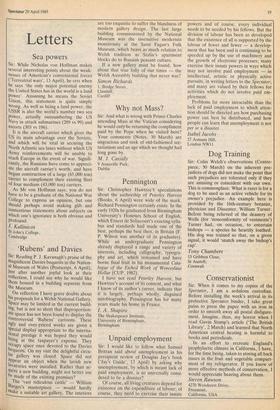Unpaid employment
Sir: I would like to follow what Samuel Brittan said about unemployment in his percipient review of Douglas Jay's book ('Jay's Guide', 13 April) by asking why unemployment, by which is meant lack of paid employment, is so universally consi- dered to be a disaster?
Of course, all living creatures depend for existence on the expenditure of labour; of course, they need to exercise their innate
powers and of course, every individual needs to be needed by his fellows. But the division of labour has been so developed that the existence of all is supported by the labour of fewer and fewer — a develop- ment that has been and is continuing to be speeded up by the use of machinery and the growth of electronic processes; many exercise their innate powers in ways which may not involve paid employment — in intellectual, artistic or physically active pursuits, in writing letters to the Spectator; and many are valued by their fellows for activities which do not involve paid em- ployment.
Problems far more intractable than the lack of paid employment to which atten- tion should be directed are how purchasing power can best be distributed, and how people can learn that unemployment is not per se a disaster.
Isabel Jacobs
27 Asmuns Hill, London NWII














































 Previous page
Previous page